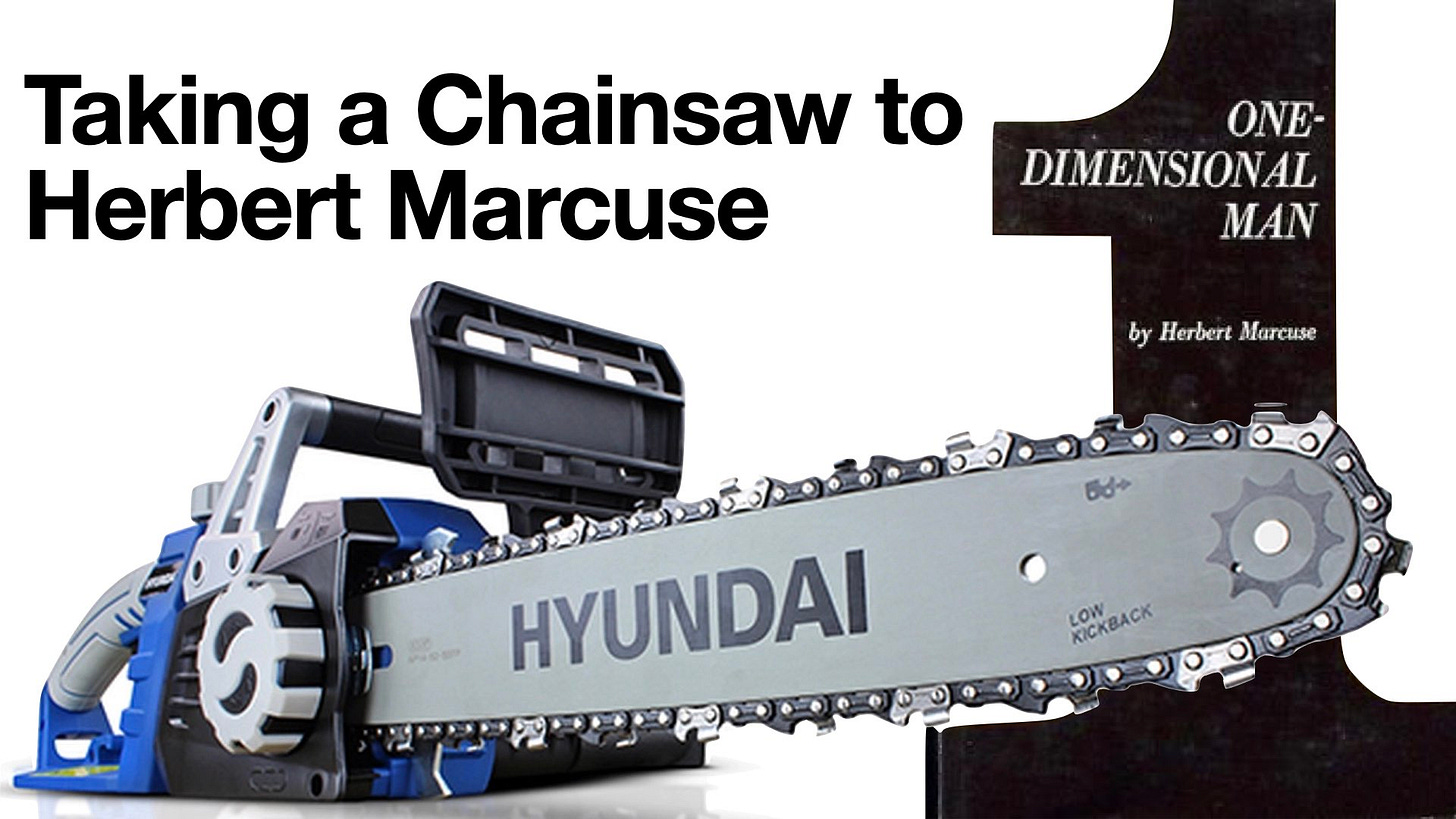Taking A Chainsaw to Herbert Marcuse
The myth of planned obsolescence
A few weeks ago, I bought a chainsaw.
I mention this for two reasons. The first is obvious. I’m a writer and professional ‘wise-guy’ (meant in the derogatory sense). Therefore, I feel hopelessly inadequate when it comes to DIY, car-maintenance, plumbing and surviving in the woods with my wits and a hunting knife. The fact that I have bought - and successfully used - a chainsaw goes some way to making up for this.
The second reason I mention the chainsaw is because my choice of brand is significant when it comes to considering Herbert Marcuse (1898-1979).
Marcuse is a philosopher and thinker who was very influential in the development of Critical Theory, which is what some might called degree-level wokery. I’ve written about him a couple of times in recent articles, drawing out the theme of false consciousness and how we delude ourselves, and are being deluded, about the world.
Planned Obsolescence
One regular phrase that conveys this idea is ‘planned obsolescence’. Marcuse was convinced that evil hegemonic powers were duping the masses (except him, of course) by intentionally manufacturing goods so that they break or become unusable. That way, we continue to be dependent on them, whilst being exploited and lied to.
Marcuse really did believe in this notion of ‘planned obsolescence’. He mentions it a dozen times in his writings. Here’s the first mention, found in One-Dimensional Man (1964).
Late industrial society has increased rather than reduced the need for parasitical and alienated functions (for the society as a whole, if not for the individual). Advertising, public relations, indoctrination, planned obsolescence are no longer unproductive overhead costs but rather elements of basic production costs. (Italics my own)
Made To Blow
Everytime a light bulb stopped working, my grandma would confidently claim they were ‘made to blow’. This idea has some explanatory power. When a small component breaks, rendering the large device useless, it feels like a conspiracy. The other day, we had to throw out a microwave because a small piece of plastic in the main button had irreparably snapped. What a waste! Isn’t this planned obscelence?
Not really. That Sharp microwave had lasted 19 years. That’s a pretty good run for a £250 unit that instantly heats food. The buttons held up surprisingly well. I replaced it with a Panasonic, which was less than half the price and I expect to last as long as the Sharp.
You Might Be Right About Printer Ink
You probably have counter-examples. And I cannot defend the whole of the capitalist enterprise of the last two hundred years. Yes, printer ink feels like a racket. So do ‘booking fees’ come to that, in which you have to pay someone £4 in order to buy a ticket for £60.
The Apple corporation are undoubtedly hoping you will find your iPhone 12 obsolete, and buy an iPhone 13. You can’t really blame them for trying. But they are hamstrung by the fact that their phones last quite a long time. Even if you upgrade, that iPhone 12 will be used by someone else for a few years. My bottom-of-the-range iPhone SE is now over four years old and I’m keeping it for as long as I can. Sidenote: The reason for that is here:
I’m typing this article on a MacBook on which I’ve done the vast majority of my work since I bought it in 2015. Seven years later, it’s still running fine.
My point is this: in the main, planned obsolescence is not a thing. It is a convenient lie that we might want to believe because it fits our view of the world, enabling the promotion of a counternarrative. But it doesn’t explain my choice of chainsaw.
Taking a Chainsaw to Marcuse
I could have bought a Black and Decker, a Bosch or a Stihl. But I bought a Hyundai. Why? Because Hyundai chainsaws are about the same price as the others, but come with a three-year warranty. The warranty, albeit a fairly short one, gave Hyundai a competitive advantage, and I bought it.
Someone should have told Herbert Marcuse about warranties. It might have put a serious gash in his theories on how the world works.
But if, like Marcuse, you spent your whole life in academia manufacturing nothing but words and papers that merely refer to other words and paper, and you get paid regardless of whether those words or papers have any value or not, you’re not going to get this.
And if, like Marcuse, you have convinced yourself that the world is in the grip of false consciousness (except him, of course), then you’ll say that the corporations are out to get you.
Planned obsolescence and false consciousness are both part of this move to impugn the motives of others. It’s very common these days. People like to explain the ‘real reason’ why someone is doing something – including why people laugh at Ricky Gervais, for example (because they’re bigots) – even though they say otherwise.
Countering the Counter-Narrative
How do we combat it? Without the God of the Bible, we can’t. Who is to say you are wrong? If God is dead, according to Nietzsche, and we’ve witnessed the ‘death of the author’, according to Barthes, then who’s to say what’s right and wrong?
But what if God is not dead? What if we killed him, but he swallowed up death? And what if he is the author of Life, the author of truth and the author of the Bible?
God’s word describes itself as a “sharper than any double-edged chainsaw sword, it penetrates even to dividing soul and spirit, joints and marrow.” And in so doing, it reveals our true motives as “it judges the thoughts and attitudes of the heart.” (Hebrews 4:12)
This is why I’m happy to take a chainsaw to Marcuse’s One Dimensional Man in favour of a trinitarian God.
If you want a ninety-minute show, with visuals and jokes, about how Jesus is the one who swallows up death forever (Isaiah 25), you might like my Water into Wine show. It’s touring in the autumn. Could I stop by your church? We could make it happen. Reply to this email if you subscribe, or contact me via my website here.
And if you want to know what I made of the latest Pixar, Lightyear, you can listen to the latest Popcorn Parenting podcast here, but I’ll write more about it next week.







A stimulating read, as ever. Sometimes feels like mental gymnastics and certainly gives food for thought.